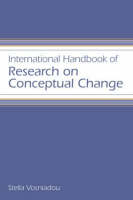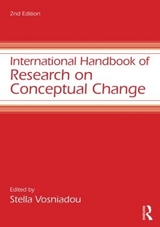
International Handbook of Research on Conceptual Change
Routledge (Verlag)
978-0-8058-6045-0 (ISBN)
- Titel erscheint in neuer Auflage
- Artikel merken
The study of conceptual change traces its heritage to the notions of paradigm (networks of shared beliefs, concepts, practices) and paradigm shift made famous by Thomas Kuhn in his book, The Structure of Scientific Revolutions. Kuhn’s work was quickly linked to developmental psychology (how knowledge develops) and to science education (teaching big, new ideas). This book is the first comprehensive review of the conceptual change movement and of the impressive research it has spawned on how knowledge develops and can be taught in different content areas. Because of its interdisciplinary focus chapter authors were instructed to write in a manner comprehensible to researchers and students from different fields.
The International Handbook of Research on Conceptual Change consists of twenty-seven chapters that clarify the nature of conceptual change research, describes its most important findings and demonstrates their importance for education. It is organized into six sections that include detailed discussions of key theoretical and methodological issues, the roots of conceptual change research in the philosophy and history of science, mechanisms of conceptual change, and learner characteristics. It also contains chapters that describe conceptual change research in the content areas such as physics, astronomy, biology, medicine and health, and history. A particular focus is given to students’ difficulties in learning more advanced and counter-intuitive concepts.
Stella Vosniadou is Professor of Cognitive Psychology in the Department of Philosophy and History of Science at the National and Kapodistrian University of Athens. She is the current chair of the interdisciplinary graduate program in Cognitive Science between the University of Athens and the Economic University of Athens, and director of the Cognitive Science Laboratory at the University of Athens. Professor Vosniadou has served as a president of the European Association for Research on Learning and Instruction (EARLI) and organizer and chair of the 1997 EARLI conference in Athens, Greece.
Introduction Part 1: Philosophical Foundations 1. The Problem of Conceptual Change in the Philosophy of Science 2. The Conceptual Change Approach in the History of Science 3. The Conceptual Change Approach in Psychology 4. The Conceptual Change Approach and the Teaching of Science Part 2: The Conceptual Change Approach in Developmental Psychology 5. Conceptual Acquisition and Change 6. The Problem of Conceptual Change in Development 7. Conceptual Development as Theory Change: A Cognitive/Computational Account 8. The Development of Mathematical Cognition and the Problem of Conceptual Change Part 3: Conceptual Change in Learning and Instruction 9. Fragmentation and Conceptual Change 10. A Framework Theory Approach to Conceptual Change 11. Conceptual Change as an Ontological Shift 12. A Cognitive-Sociocultural View of Conceptual Change 13. Conceptual Change as Social Fact 14. Phenomenography and Conceptual Change Part 4: The Conceptual Change Approach in the Content Areas 15. Conceptual Change in Physics 16. Conceptual Change in Astronomy 17. Conceptual Change in Chemistry 18. Conceptual Change in Biology 19. Conceptual Change in History 20. Conceptual Change in Mathematics 21. Conceptual Change in Medicine 22. Conceptual Change in Engineering 23. Teachers and Conceptual Change Part 5: Learner Characteristics and Conceptual Change 24. Metacognitive Knowledge in Conceptual Change 25. Epistemological Beliefs and Conceptual Change 26. Intentional Conceptual Change 27. Beliefs, Motivation, and Personal Epistemologies in Conceptual Change 28. Transfer of Learning and Conceptual Change Part 6: Teaching for Conceptual Change 29. Teaching Science for Conceptual Change 30. Teaching for Understanding in the Elementary School Classroom 31. The Role of Analogies and Models in Teaching for Conceptual Change a32. Teaching with Technology for Conceptual Change
| Erscheint lt. Verlag | 31.7.2008 |
|---|---|
| Reihe/Serie | Educational Psychology Handbook |
| Zusatzinfo | Following same style as Hbk Moral Character Educ (same series); 38 Tables, black and white |
| Verlagsort | New York |
| Sprache | englisch |
| Maße | 178 x 254 mm |
| Gewicht | 1293 g |
| Themenwelt | Sozialwissenschaften ► Pädagogik ► Allgemeines / Lexika |
| Sozialwissenschaften ► Pädagogik ► Bildungstheorie | |
| ISBN-10 | 0-8058-6045-2 / 0805860452 |
| ISBN-13 | 978-0-8058-6045-0 / 9780805860450 |
| Zustand | Neuware |
| Informationen gemäß Produktsicherheitsverordnung (GPSR) | |
| Haben Sie eine Frage zum Produkt? |
aus dem Bereich



